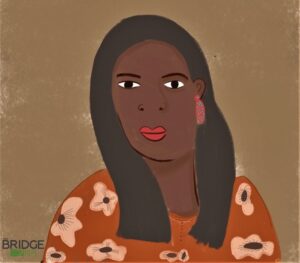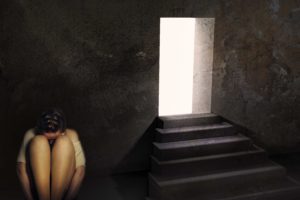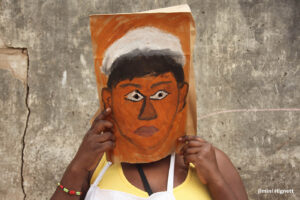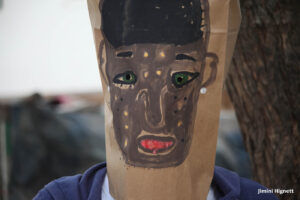Survivors' stories
TheBridge2Hope recorded many stories of survivors of human trafficking and exploitation. These are just a few of the harrowing examples.
The Bridge to Hope
"I received counseling to learn to process the trauma I had experienced and move on."
 My name is Patricia and this is my story. I was born and raised in Nigeria, but in 1994, when I was just 16, I was trafficked to Europe. I was taken to Italy where I stayed until 2011. I decided to move to the Netherlands to find good medical care for my child who was suffering from cancer. In 2014, I met a church pastor who introduced me, and several other women who were in a similar situation as me, to Foundation TheBridge2Hope (TB2H). Six women, along with me, joined TB2H. We were the first cohort of participants.
My name is Patricia and this is my story. I was born and raised in Nigeria, but in 1994, when I was just 16, I was trafficked to Europe. I was taken to Italy where I stayed until 2011. I decided to move to the Netherlands to find good medical care for my child who was suffering from cancer. In 2014, I met a church pastor who introduced me, and several other women who were in a similar situation as me, to Foundation TheBridge2Hope (TB2H). Six women, along with me, joined TB2H. We were the first cohort of participants.
When I came to TheBridge2Hope , I had no house, no job, no papers, and I was very frustrated with the situation I was in. At TB2H, I received a lot of help and support. I received counseling to learn to process the trauma I had experienced and move on. Mr. Peter Korst taught me how to speak and write Dutch, I learned computer skills and even fun things like knitting. TB2H helped me tremendously in those first days to find the courage to go on and build a good life for myself and my son. My son was quite young and it was difficult to support him. It is difficult to find work when you have no papers, but with TB2H's help I was able to get my residence permit. I had to hire a legal advisor to get my papers through the court and TheBridge2Hope helped pay for that. I could rely on the people who were behind me, people who would help and support me no matter what. Of course, it took me too to get where I am today.
Now I have my own home, a steady job and soon I will get my Dutch passport. My son is doing a college education and is doing well. I want to share my story so that people who are in a similar situation as me know that there is hope, that it is possible to change your life, that there is a bridge to hope. You just have to get up there and keep moving forward step by step.
Removed from family
"They have my passport and everything I brought with me"

I was taken away from my family when I was only fourteen. They told my mother that they would take me to Europe where I could go to school, work and that I would get rich. It was hard for her, but she let me go. They lied.
They have my passport and everything I brought with me. My kidnappers raped me. I got pregnant when I was 15. One day I saw the men kill two of the other girls. They buried them behind the house. I was safe because they didn't see me.
I was sent to Germany. They told me the white men would love me more because I was pregnant. They said they would pay me more money. They lied. I was alone when I gave birth to my son. I had to leave him in Berlin.
I'm now 36 years old. I live in fear every day. I don't sleep well. I'm afraid they'll find me and kill me. I don't go to the store, to the church, or to the park with my two-year-old son. I don't leave my house. I don't trust anyone, not even the police.
I want to go home to see my family. I want to be with them so badly, but I can't. The men still want money from me. If I go home, they'll kill me because I don't have the money they want from me. The police in Nigeria don't help me; they handle such things as this like a simple shoplifting.
It started out as a dream for a better life, but the lies turned into a nightmare. Now I dream of freedom. I dream of being with my family. I dream of being normal.
Left behind with four children
"I didn't understand what was going on at first, but before I knew it, she had sold me."
 I'm from Colombia. I was eighteen when I married, but he left me. He left me and our four children; they are still in Colombia. After my husband ran away, I was left with all the debts, the house and the children. I was stuck.
I'm from Colombia. I was eighteen when I married, but he left me. He left me and our four children; they are still in Colombia. After my husband ran away, I was left with all the debts, the house and the children. I was stuck.
I had a friend who lived in Holland and she said she could get a job as a teacher for me. When I arrived, they took me to a house. At first I didn't understand what was going on, but before I knew it, she had sold me.
And that's been my life so far. Sometimes I eat, sometimes I have five to six clients and they keep all the money. You never know how much you get or even how much money you owe them; she keeps all the money. I want to go back to Colombia, I want to find my children, but to go back I need papers and they took everything. They burned my papers and passport.
After being there for a while, one of the girls started to teach me Dutch. I told the girls there that I can't do this if I don't understand the language. And they said, "Yes, you can. You just open your legs and close your mouth." If I didn't want to do something, they'd beat me and tie me to the bed. They put something in my mouth so I couldn't scream, and blindfolded me while the men came. One after the other, one after the other...
All we want is some kind of protection, a place where we can go and feel like a person. A good bed, some food and a way out.
If there is a place where they can't find you, if there is a place where you can start all over again and feel like a human being, that's the most important thing.
I want to go to the toilet without people standing in front of me, keep you tied up, I want to drink a glass of water, without being insulted. People take things for granted, but they don't know how blessed they are.
With many thanks to artist-activist Jimini Hignett for making her photos available to us from one of her ongoing projects with survivors of the sex industry. These self-portraits, painted on paper bags, show how they see themselves.
The story of a male victim
They promised me I'd work in an apple orchard. Instead, they took me to a club.
 This is the story of a male victim of the sex trade. He is currently 48 years old, and from the age of 37 to 41 he was a sex worker in Amsterdam.
This is the story of a male victim of the sex trade. He is currently 48 years old, and from the age of 37 to 41 he was a sex worker in Amsterdam.
"I came from Senegal in 2002. A man brought me here. He saw my condition. I was suffering. He said he would help. He said he could help me get abroad. I could get on a plane and get a job, I could be a better man. I agreed, so they took me with them.
They promised me I'd work in an apple orchard. Instead, they took me to a club. People came to me. I wondered why there were only men, not women. The men started to touch me. "What?" I said. "I'm not doing this!?" They told me I had to. I didn't know anyone, I was scared, so I followed their orders. I did this in Amsterdam for four years. Sometimes I get (still) terrible dreams; people chasing me, and demons...
I intend to go to my country as spokesman. If I'm threatened, I can come back here. In Africa they don't have courts and the middlemen have money. They pay the judge, they pay the police, they pay all those people with authority and you get no protection. But if I have my documents, I can go back and then I'll tell them everything. If they threaten me, I'll go back. If I go without documentation, I have a very big problem.
The problem arises because of the poverty there. Because whatever you tell the poor people there, they're tempted. The traders will come. You always see them with a different car, you see how they spend money and you want to live a life like that. All I want to do is help those poor people in Africa. Their eyes are blind and they close their ears. Human traffickers and anyone who helps them should be prosecuted. ‘
With many thanks to artist-activist Jimini Hignett for making her photos available to us from one of her ongoing projects with survivors of the sex industry. These self-portraits, painted on paper bags, show how they see themselves.



